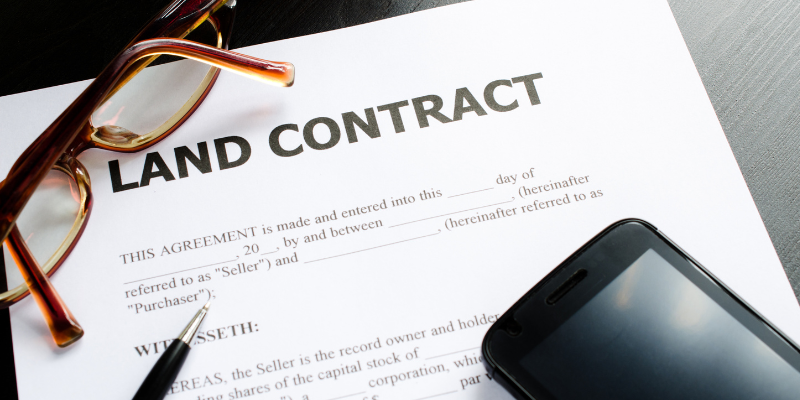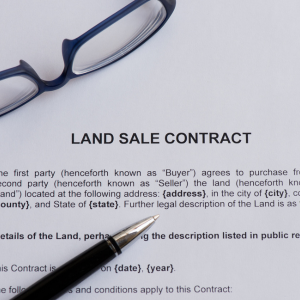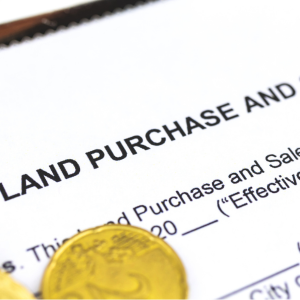
Understanding Land Sales Contracts: A Comprehensive Guide

When buying or selling property in Georgia, it’s important to know how land sales contracts work. A land sales contract in Georgia is a legal document that spells out the rules and conditions for selling a piece of land.
It has important parts like the closing date, payment terms, property description, and purchase price. To avoid possible legal problems, both buyers and sellers need to make sure that the contract follows Georgia state laws.
To protect both parties’ interests, the contract should spell out things like financing terms or inspections. In Georgia, the contract must clearly state any easements or encumbrances that come with the property.
It’s also important to know what escrow services do, which is to hold money until all contract terms are met. Hiring a qualified real estate attorney can help make sure that the land sales contract follows all state laws and protects everyone involved from the risks that come with real estate deals in Georgia.
Key Elements of a Land Sales Contract in Georgia, US
When creating a land sales contract in Georgia, it is critical to include several key elements to ensure that the agreement is legally binding and enforceable. The contract must clearly identify all parties involved, including the seller and buyer, using their legal names.
To avoid disputes, the property must be described in detail, using precise legal descriptions that match county records. Clearly state the purchase price, any required deposits or earnest money, and payment terms.
Financing terms must be included if applicable, including whether the transaction is subject to loan approval. Contingencies are another important consideration, allowing either party to withdraw under certain conditions, such as inspection results or title issues.
The closing date, any tax or utility prorations, and closing cost responsibilities should all be specified. Additionally, both parties must agree on which fixtures or improvements will remain with the land after the sale.
Including disclosures about environmental hazards or zoning restrictions helps comply with state regulations. Finally, all parties must sign for validation, as well as notarization if required by Georgia local laws or real estate practices.
Legal Requirements for Land Sales Agreements in Georgia
When creating a land sales contract in Georgia, it is critical to understand the legal requirements that govern such agreements in order to ensure compliance and enforceability. A valid land sales agreement in Georgia must be in writing, according to the Statute of Frauds, which requires that real estate transactions be documented to be legally binding.
The contract should clearly identify the parties involved, including full names and contact information, as well as provide a detailed description of the property being sold, which is often done using a legal description rather than just an address. The agreement between buyer and seller must include the agreed-upon purchase price.
To be legally binding, the contract must be signed by both parties. Electronic signatures are acceptable under Georgia law if they meet specific requirements. The agreement should also include any conditions or contingencies that must be met prior to closing, such as inspections or financing approvals.
Furthermore, disclosures required by state law regarding property conditions or known defects must be included to protect both parties from future litigation. Understanding these legal requirements ensures that your land sales contract is comprehensive and in accordance with Georgia real estate laws.
How to Draft a Legally Binding Land Sales Contract
To make sure your land sale contract in Georgia is enforceable and in line with state law, you should familiarize yourself with the key components that make up such contracts. The first step is to establish who is involved, which includes providing the buyer’s and seller’s correct legal names and contact details.
Include all pertinent information about the property being sold, including its legal description, parcel number, and any applicable zoning or land use restrictions, in a clear and precise manner. The purchase price, payment terms, and amount of any required deposits should be clearly stated.
Timelines for obtaining mortgage approval or other forms of funding, as well as provisions for financing contingencies, should be included. Specify who is responsible for acquiring any reports that may be required prior to closing, such as inspections or title searches.
Discuss the proration of utilities, insurance, and property taxes at closing. To safeguard all parties, make sure all disclosures mandated by Georgia law are included.
In conclusion, a well-drafted contract should clearly outline how disputes will be resolved and specify which jurisdiction’s laws will govern to ensure it is enforceable in Georgia real estate transactions. For added guidance, Fast Land Offers can help you navigate the process with confidence.
Essential Clauses in Georgia Land Purchase Agreements
When creating a land sales contract in Georgia real estate, it is important to include key clauses that provide clarity and legal safeguards for both parties involved. The purchase price and payment terms are essential elements, detailing the overall cost and the schedule for payment over time.
A comprehensive property description is essential to eliminate any uncertainty regarding the specifics of the sale. The closing date must be clearly defined, along with the circumstances that could lead to any modifications.
Contingency clauses serve to safeguard buyers by providing the option to withdraw if specific conditions, such as financing or satisfactory inspections, are not fulfilled. Utilizing county records for legal descriptions assists in verifying property boundaries and mitigating potential disputes in the future.
An earnest money clause specifies the deposit amount made by the buyer as a demonstration of good faith and outlines the conditions under which it may be forfeited or refunded. Disclosure requirements mandate that sellers furnish essential information concerning the property’s condition or any legal matters.
Finally, incorporating dispute resolution methods like mediation or arbitration can help avoid protracted court battles should disagreements occur. Incorporating these essential elements ensures that both buyers and sellers are adequately safeguarded during the transaction process in Georgia’s real estate market.
Step-by-step Process for Creating a Land Sale Contract
Creating a land sale contract in Georgia entails several critical steps to ensure legality and clarity for the buyer and seller. First, gather all relevant information about the property, such as its legal description and any existing encumbrances or liens.
Next, identify the parties involved by providing their full legal names and addresses. It is critical to define the purchase price, payment terms, and any other factors that may influence the transaction.
Also, specify important dates like the closing date and deadlines for meeting any conditions. Please disclose any environmental issues or zoning restrictions that may have an impact on the land’s future use.
Clearly define who is responsible for paying closing costs and other fees when transferring ownership. Ensure that both parties are aware of their obligations in terms of inspections, title insurance, and, if applicable, financing.
Before signing a land sale contract, ensure it complies with Georgia’s specific legal requirements.
Common Mistakes to Avoid in Georgia Land Sales Contracts
When writing a Georgia real estate land sales contract, it’s important to stay away from common mistakes that could cause legal problems or financial loss. One common mistake is not clearly defining the property’s boundaries and legal description, which can lead to arguments about what is really being sold.
Also, not paying enough attention to contingencies and conditions, like financing terms or inspection periods, often causes problems between buyers and sellers. Another mistake is not making sure that you follow Georgia’s rules for land transactions, such as properly disclosing any liens or encumbrances on the property.
People involved should also be careful not to skip important steps like doing a title search or getting the surveys they need, which would be a sign of not doing their due diligence. Also, not including clear terms about earnest money deposits can make it unclear what will happen if the deal falls through.
Finally, unclear language in the contract can lead to interpretations that are bad for one party. This is why every part of the agreement needs to be clear and precise.
Negotiation Strategies for Successful Land Purchases

When negotiating a land sale contract in Georgia real estate, it is critical to use effective strategies to ensure a successful purchase. First, conduct extensive research on the property’s market value, zoning regulations, and potential environmental concerns.
This information lays a solid foundation for negotiations and enables you to make informed decisions. Developing rapport with the seller can also be beneficial; establishing trust may result in more favorable terms.
Before beginning discussions, it is critical to clearly define your goals and priorities, whether they are to secure a lower purchase price or flexible financing options. Consider hiring a skilled real estate attorney who is familiar with Georgia property law to help you navigate the contract’s complex clauses and contingencies.
Furthermore, creative problem-solving and a willingness to compromise can lead to mutually beneficial outcomes, such as agreeing on shared closing costs or adjusting timelines to meet both parties’ needs. Buyers can improve their chances of obtaining favorable terms in their Georgia land purchase contracts by effectively employing these negotiation tactics.
Importance of Due Diligence Before Signing a Contract
Performing due diligence before entering into a land sales contract in Georgia real estate is essential for a seamless transaction. This involves carefully reviewing the property’s legal standing, zoning requirements, and any existing liens or encumbrances that could affect ownership. To make things easier, learn more about how our process works to simplify real estate decisions.
Buyers must verify property boundaries through surveys to avoid future disputes with neighbors, as well as ensure compliance with local zoning laws to confirm that intended uses are permitted. Furthermore, understanding environmental factors, such as flood zones or contamination concerns, is critical for making sound decisions.
It is critical to examine the title history for any prior claims that may complicate future ownership. Engaging with professionals such as real estate attorneys and title companies can provide invaluable insights during this phase, assisting in mitigating risks associated with unforeseen legal issues or financial obligations related to property.
Buyers can draft a land sales contract that aligns with their investment goals and protects their interests in the Georgia real estate market with confidence after conducting thorough due diligence.
Dispute Resolution Mechanisms in Georgia Real Estate Contracts
The dispute resolution mechanisms must be comprehended by both buyers and sellers when drafting a land sales contract in Georgia real estate. In Georgia, it is not uncommon to include clauses that specify specific methods for resolving potential disputes, such as arbitration or mediation.
Mediation is a process in which a neutral third party facilitates negotiations between the parties in order to reach a voluntary settlement. In contrast, arbitration is a more formal process in which an arbitrator renders binding decisions based on the evidence presented.
These alternative dispute resolution methods can be advantageous due to their ability to achieve faster resolution timelines than traditional litigation and their tendency to reduce legal expenses. Additionally, arbitration agreements in real estate contracts are recognized as enforceable by Georgia law, which makes it a popular choice for parties seeking a swift resolution to disputes.
Parties can more effectively manage expectations and reduce uncertainty in the event of disagreements during the transaction by explicitly defining these mechanisms in the contract.
Finalizing the Deal: Recording and Transferring Ownership
After everyone has looked over and agreed to the terms of the land sales contract, the last step in Georgia is to carefully record the sale and transfer ownership. As part of the closing process, you need to make sure that the deed is properly signed, prepared, and notarized according to Georgia real estate laws.
You must file the deed with the right county clerk’s office so that it can be made public. This lets other people know who owns the property. This step protects both the buyer and the seller by making the transfer of title official in writing.
In Georgia, this usually means paying any transfer taxes or filing fees that apply. Making sure that these steps are done right will help avoid future arguments over property rights.
Getting title insurance can protect you from unexpected claims on the land. Buyers can be sure they own the property, and sellers can meet their legal obligations by carefully handling these details.
Can I Write Up My Own Land Contract?
Understanding the legal requirements and implications is crucial when contemplating the possibility of drafting one’s own land sales contract for a real estate transaction in Georgia. A land sales contract is an essential document that delineates the terms and conditions of the property sale between the buyer and seller.
It is highly advisable to consult with a real estate attorney in Georgia to ensure compliance with state laws and regulations, despite the fact that it is legally permissible for individuals to draft their own land contracts. The contract must contain specific elements, including the property description, purchase price, payment terms, and any contingencies or special agreements.
Additionally, in order to mitigate potential disputes or legal complications in the future, it is imperative that both parties are cognizant of their rights and obligations under Georgia real estate law. The potential for oversights that could impact enforceability may result from the use of templates or generic forms that lack customization.
While it is possible to draft your own land sales contract, it’s often wiser to consult a professional to safeguard your interests and provide peace of mind in such a complex real estate process. For those looking to streamline their property transactions, working with investor home buyers can also be a practical solution.
How Do I Write a Simple Land Purchase Agreement?
To make sure the contract is thorough and enforceable, it is crucial to include a few essential elements when creating a basic land purchase agreement for Georgia real estate. Begin by clearly identifying the parties to the transaction, including the buyer’s and seller’s full names and contact details.
In order to properly identify the land being sold, it is essential to include the property’s legal description. Provide the purchase price along with the terms of payment, including any deposits or financing agreements.
Describe any requirements or backup plans, like title searches or inspections, that need to be fulfilled prior to closing. Set a deadline and specify what will happen if one party doesn’t carry out their end of the bargain.
It’s crucial to include provisions regarding insurance obligations, property taxes, and any easements or land restrictions that may be in place. Lastly, to confirm the agreement, both parties must sign and date the document.
Speaking with a real estate lawyer versed in Georgia’s property laws can help ensure that your land sales contract satisfies all legal requirements.
How to Draw Up a Land Contract?

It is very important to make sure that a land sales contract in Georgia real estate is complete and legally sound. First, make a list of everyone who is part of the deal, along with their full names and contact information.
Clearly explain what you are selling, including the property’s legal description and any zoning information that is important. List the price of the item and the payment terms, including any deposits, financing options, or installment plans.
Include things like inspections, appraisals, or title searches that need to be done before the deal can go through. List who is responsible for closing costs and set a date for closing.
Talk to a qualified real estate lawyer to make sure the contract follows Georgia real estate laws. They can help you understand the terms of disclosures, warranties, and possible liabilities. Lastly, a notary public should be present when both parties sign the contract to make sure it is legal in Georgia.
How Much Does It Cost to Write Up a Land Contract?
In Georgia real estate, it’s important for both buyers and sellers to understand the expenses involved in drafting a land sales contract. These costs can vary widely depending on factors such as the transaction’s complexity, attorney fees, or whether you choose to use a standard template. If you’re hoping to move on from your property quickly, working with cash home buyers in Georgia and surrounding states can sometimes help simplify the process.
The cost of hiring a qualified real estate attorney in Georgia typically ranges from $500 to $1,500, depending on the specific requirements of the contract and the complexity of the land deal. Attorneys guarantee that the contract is compliant with Georgia state laws and that all legal aspects are addressed.
On the other hand, the use of an online service or the acquisition of a standard template may result in a reduction in costs; however, if not customized to your unique circumstances, the risks may increase. Title searches, filing fees, and any necessary surveys or appraisals required during the drafting process may result in additional expenses.
When formulating a comprehensive land sales contract in Georgia real estate, it is imperative to evaluate these expenses against the potential hazards of inadequate documentation and to conduct a thorough due diligence.
Helpful Georgia Blog Articles
- Can You Sell Land if You Owe Taxes in Georgia
- Can You Sell Land if You’re in Foreclosure in Georgia
- How to Sell Inherited Land in Georgia
- How to Find Out Zoning of My Land in Georgia
- Paperwork for Selling Land by Owner in Georgia
- How to Sell Land Without an Agent in Georgia
- How to Sell Land With a Lien in Georgia
- How to Sell Land with Mineral Rights in Georgia
- How To Gift Land To A Family Member In Georgia
- Effective Strategies For Quickly Selling Land In Georgia’s
- Mastering The Art Of Selling Land At Auction In Georgia’s
- Comprehensive Guide To Drafting A Land Sales Contract In Georgia

| LEGAL CONTRACT | CONTRACTS FOR DEED | INSTALLMENT LAND CONTRACTS | LAND-CONTRACT | LEGAL TITLE | EQUITABLE TITLE |
| REAL PROPERTY | LICENSES | LICENSING | FARM | LENDER | |
| DEFAULT |